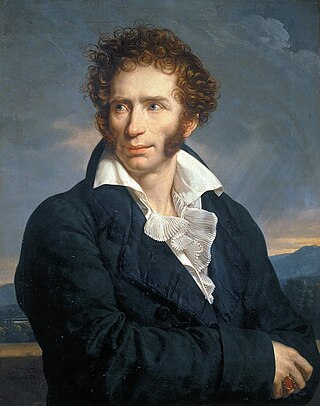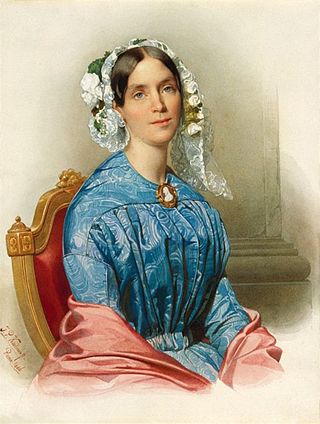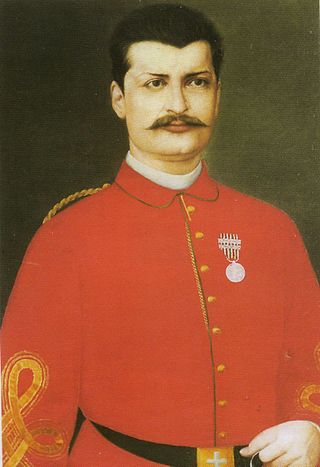Related Research Articles

Giuseppe Mazzini was an Italian politician, journalist, and activist for the unification of Italy (Risorgimento) and spearhead of the Italian revolutionary movement. His efforts helped bring about the independent and unified Italy in place of the several separate states, many dominated by foreign powers, that existed until the 19th century. An Italian nationalist in the historical radical tradition and a proponent of a republicanism of social-democratic inspiration, Mazzini helped define the modern European movement for popular democracy in a republican state.

The unification of Italy, also known as the Risorgimento, was the 19th-century political and social movement that resulted in 1861 in the consolidation of various states of the Italian Peninsula and its outlying isles into a single state, the Kingdom of Italy. Inspired by the rebellions in the 1820s and 1830s against the outcome of the Congress of Vienna, the unification process was precipitated by the Revolutions of 1848, and reached completion in 1871 after the capture of Rome and its designation as the capital of the Kingdom of Italy.

Ugo Foscolo, born Niccolò Foscolo, was an Italian writer, revolutionary and poet.

George Macaulay Trevelyan was a British historian and academic. He was a Fellow of Trinity College, Cambridge, from 1898 to 1903. He then spent more than twenty years as a full-time author. He returned to the University of Cambridge and was Regius Professor of History from 1927 to 1943. He served as Master of Trinity College from 1940 to 1951. In retirement, he was Chancellor of Durham University.

The Redshirts, also called the Red coats, are volunteers who followed the Italian patriot Giuseppe Garibaldi during his campaigns. The name derived from the colour of their shirts or loose-fitting blouses that the volunteers, usually called Garibaldini, wore in lieu of a uniform.

Duce is an Italian title, derived from the Latin word dux 'leader', and a cognate of duke. National Fascist Party leader Benito Mussolini was identified by Fascists as Il Duce of the movement since the birth of the Fasci Italiani di Combattimento in 1919. In 1925 it became a reference to the dictatorial position of Sua Eccellenza Benito Mussolini, Capo del Governo, Duce del Fascismo e Fondatore dell'Impero. Mussolini held this title together with that of President of the Council of Ministers: this was the constitutional position which entitled him to rule Italy on behalf of the King of Italy. Founder of the Empire was added for the exclusive use by Mussolini in recognition of his founding of an official legal entity of the Italian Empire on behalf of the King in 1936 following Italy's victory in the Second Italo-Ethiopian War. The position was held by Mussolini until 1943, when he was removed from office by the King and the position of "Duce" was dismantled, while Marshal Pietro Badoglio, 1st Duke of Addis Abeba was appointed Presidente del Consiglio.

The Expedition of the Thousand was an event of the unification of Italy that took place in 1860. A corps of volunteers led by Giuseppe Garibaldi sailed from Quarto dei Mille near Genoa and landed in Marsala, Sicily, in order to conquer the Kingdom of the Two Sicilies, ruled by the Spanish House of Bourbon-Two Sicilies. The name of the expedition derives from the initial number of participants, which was around 1,000 people.

Giuseppe La Farina was an influential leader of the Italian Risorgimento. He was founder of the Italian National Society in 1857, a society dedicated to the unification of Italy.

Jessie White Mario was an English writer and philanthropist. She is sometimes referred to as "Hurricane Jessie" in the Italian press.

The bilateral relations between the Italian Republic and the United Kingdom of Great Britain and Northern Ireland are warm and exceptionally strong. This relationship is also known as Anglo–Italian relations.

The Army of the Vosges was a volunteer force placed under the command of Giuseppe Garibaldi, formed in order to ensure the defense of the road to Lyon from the Prussian Army during the Franco-Prussian war.
Denis Mack Smith CBE FBA FRSL was an English historian who specialized in the history of Italy from the Risorgimento onwards. He is best known for his biographies of Garibaldi, Cavour and Mussolini, and for his single-volume Modern Italy: A Political History. He was named Grand Official of the Order of Merit of the Italian Republic in 1996.

Giuseppe Maria Garibaldi was an Italian general, patriot, revolutionary and republican. He contributed to Italian unification and the creation of the Kingdom of Italy. He is considered to be one of Italy's "fathers of the fatherland", along with Camillo Benso, Count of Cavour, Victor Emmanuel II of Italy and Giuseppe Mazzini. Garibaldi is also known as the "Hero of the Two Worlds" because of his military enterprises in South America and Europe.

Jan (Johan) Philip Koelman was a Dutch painter, sculptor, writer and teacher, involved during part of his life in revolutionary activity.

Andrea Aguyar, nicknamed Andrea il Moro, was a former Black slave from Uruguay who became a follower of Garibaldi in both South America and Italy, and who died in defence of the revolutionary Roman Republic of 1849.
The historian John A. Davis said in 2005, "Everyone, it seems, is busy rethinking, revisioning, revisiting, remaking, remapping or demythologizing the Risorgimento. However, it is not the Risorgimento that is being revisited but the changing images that have made it the potent founding myth of the Italian nation for successive generations of Italians." In the 20th century, and especially since the end of the Second World War, the received interpretation of Italian unification, the Risorgimento, has become the object of historical revisionism. The justifications offered for unification, the methods employed to realise it and the benefits supposedly accruing to unified Italy are frequent targets of the revisionists. Some schools have called the Risorgimento an imperialist or colonialist venture imposed by Savoy.

Italian nationalism is a movement which believes that the Italians are a nation with a single homogeneous identity, and therefrom seeks to promote the cultural unity of Italy as a country. From an Italian nationalist perspective, Italianness is defined as claiming cultural and ethnic descent from the Latins, an Italic tribe which originally dwelt in Latium and came to dominate the Italian peninsula and much of Europe. Because of that, Italian nationalism has also historically adhered to imperialist theories. The romantic version of such views is known as Italian patriotism, while their integral version is known as Italian fascism.

Camillo Paolo Filippo Giulio Benso, Count of Cavour, Isolabella and Leri, generally known as the Count of Cavour or simply Cavour, was an Italian politician, businessman, economist and noble, and a leading figure in the movement towards Italian unification. He was one of the leaders of the Historical Right and Prime Minister of the Kingdom of Sardinia, a position he maintained throughout the Second Italian War of Independence and Giuseppe Garibaldi's campaigns to unite Italy. After the declaration of a united Kingdom of Italy, Cavour took office as the first Prime Minister of Italy; he died after only three months in office and did not live to see the Roman Question solved through the complete unification of the country after the Capture of Rome in 1870.

Achille Cantoni was an Italian war volunteer who fought in the Second and Third Italian Wars of Independence. He is credited with saving the life of Giuseppe Garibaldi, an Italian general and central figure of the Risorgimento, during a battle in the town of Velletri in 1849. He died at the Battle of Mentana on November 3, 1867. After his death, Giuseppe Garibaldi wrote a novel entitled Cantoni il volontario in his honor.
This bibliography of Italy is a list of books in the English language on the general topic of Italy.
References
- ↑ "Lucy Riall elected to prestigious British Academy fellowship". European University Institute. Retrieved 22 May 2020.
- ↑ "Department of History and Civilization welcomes new professors - European University Institute". Archived from the original on 18 October 2012. Retrieved 12 October 2012.
- ↑ "SAGE Publications Ltd". Uk.sagepub.com. Retrieved 8 October 2017.
- ↑ Reviews: Roland Sarti H-Net review October 2007; David Gilmour "The lion or the donkey?" Archived 2011-06-05 at the Wayback Machine , The Spectator , 10 May 2007; Tim Parks, "The Insurgent: Garibaldi and his enemies", The New Yorker , 9 July 2007; Alexander Stille "The Hero Machine", The New Republic , 16 August 2007